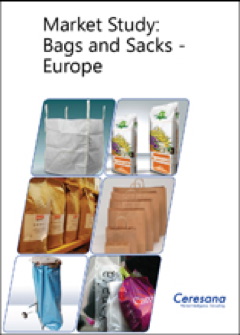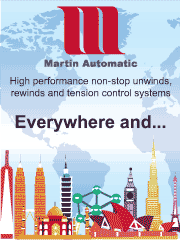Ceresana Issues Study on Bags & Sacks in Europe
- Published: June 03, 2014
KONSTANZ, GERMANY | A new study from market research institute Ceresana covers the European market for plastic and paper bags and sacks.
The report says that, although plastics bags are increasingly attacked by environmental activists and legislators alike, the consumption of plastic packaging continues to rise.  Analysts expect European demand for these products to increase to approx. 9.12 million tonnes until 2020. Polyethylene is the by far most common material for the production of bags and sacks, but in specific applications other plastic films, woven plastic bags, and paper reach higher market shares. This new study mainly considers carrier bags, garbage bags and sacks, heavy-duty and industry sacks, as well as food packaging (including beverages).
Analysts expect European demand for these products to increase to approx. 9.12 million tonnes until 2020. Polyethylene is the by far most common material for the production of bags and sacks, but in specific applications other plastic films, woven plastic bags, and paper reach higher market shares. This new study mainly considers carrier bags, garbage bags and sacks, heavy-duty and industry sacks, as well as food packaging (including beverages).
The problem of one-way carrier bags made from plastic is not equally severe in all European countries. Besides per capita consumption and amount of reuse, negative effects also depend on the quality of the national waste management industry and the respective disposal and recycling systems. In part, these vary widely. The EU Commission stipulated the objective to reduce consumption of plastic carrier bags. An amendment of the directive 94/62/EG is designed to allow room for national bans on certain types of carrier bags. In regard to the current situation, however, consistent action against one-way plastic carrier bags across the EU is unlikely to happen during the upcoming years.
Independent of EU legislation, individual countries already banned certain carrier bags or are trying to reduce consumption of various products by introducing high taxes and fees (e.g. Italy or France). Usually, thin one-way carrier bags made from PE are targeted by these initiatives. Carrier bags made from bioplastics are often exempt from the bans and fees. These are plastics that are either made from renewable resources (e.g., corn starch) or are at least supposed to be biodegradable. Their importance rose notably in previous years, the study says, but composting of these "eco-bags" in dedicated facilities is not without problems. Sometimes the burning of these bags is still advertised as the ecologically most sensible solution. Even though the market has been developing at highly dynamic rates in the past, carrier bags made from bioplastics alone will not provide the ultimate solution to the problem according to the report.
Heavy-duty and industry sacks have gained importance during the past years. Some segments, however, have substituted conventional paper sacks for sacks made from plastics. In areas such as animal feed or construction materials, e.g., cement, paper sacks continue to play an important role, but given their good properties sacks made from PE have the potential to gain additional market shares in these segments in the future. Yet, conventional heavy-duty sacks made from plastic films are faced with increasing competition from "Flexible Intermediate Bulk Containers" (FIBC), bulk goods especially. These FIBC are made from stable woven plastics, often polypropylene, and can reach a capacity of up to 1,500 liters. They are often used as transport packaging for construction materials, fertilizers, grain, or other bulk goods.
The study says an increasing trend toward plastic pouches is becoming apparent in the market for foodstuff packaging (includes beverages). They are substituting metal tins and glass jars in particular. One advantage of plastic pouches is that they can adapt to the size of the packaged good, says the report, which allows for the optimization of packaging size. Also, the packaging can be manufactured in microwaveable varieties, a property that becomes more and more important in the course of an increased focus on convenience products. In regard to lightweight packaging bags and sacks as well as heavy industry sacks, modern f/f/s processes are becoming more important.













